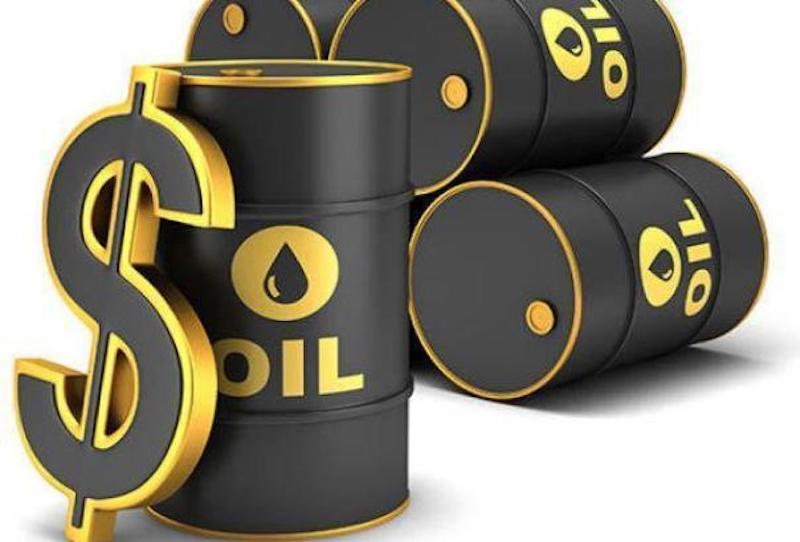Commodities News & Agribusiness
Crude Oil Nears $77 to Hit Three-year Level
Published
5 years agoon

Crude Oil Nears $77 to Hit Three-year Level
Read Also:
The price of crude oil continued its rally yesterday with Brent, Nigeria’s oil benchmark, nearing $77, before receding later in the day on the back of data indicating an increase in COVID-19 cases in Asia, one of the world’s biggest fuel consumers.
This is coming as the Western Zone of the Independent Petroleum Marketers Association of Nigeria (IPMAN) has directed all depots and petrol stations to ignore the threat of a strike by the national body and ensure free flow of the distribution of petroleum products in the South-west.
Brent hit a more than two-and-a-half-year high earlier in the session, climbing to $76.60, its highest since October 2018, but later retreated to $75.98 a barrel later in the day. West Texas Intermediate (WTI), the United States crude, was 10 cents, or 0.1 per cent, lower at $73.95 a barrel.
The rise in the price of the commodity comes in a week the Organisation of Petroleum Exporting Countries (OPEC) and its allies, OPEC+, is scheduled to meet to discuss the possibility of easing supply and allowing members pump more oil.
On increasing oil prices, the commodity is rising for the sixth week as fuel demand has continued to rebound on strong economic growth and increased travel, while crude supplies remain tight as OPEC+ maintains production cuts.
From May to July, OPEC+ has been gradually easing those curbs, adding 2.1 million barrels per day (bpd) to the market and will again meet on July 1, with observers betting that the cartel could decide to add further barrels in August.
On the demand side, the key factors OPEC+ will have to consider are strong growth in the United States, Europe and China, bolstered by vaccine rollouts and economies reopening.
But rising COVID-19 cases in Asia have put a modest dampener on the outlook as Indonesia is battling record-high cases, Malaysia is set to extend a lockdown and Thailand has announced new Covid-related restrictions.
Also, Iran and the United States are expected to resume indirect talks on reviving a pact over Tehran’s nuclear work. An agreement could lead to a lifting of U.S. sanctions and more Iranian crude on the market.
Physical oil markets are screaming for more supply as prices are rising in the North Sea, the key region that’s central to the value of many oil transactions, while differentials for Nigerian grades have also made notable gains.
The major challenge to opening the taps may be Saudi Arabia, OPEC’s top producer, which has so far proceeded cautiously as the oil market’s structure continues to indicate tighter inventories and the global oil market calls out for a substantial increase in supplies.
The 23-nation OPEC alliance has restored roughly 40 per cent of the almost 10 million barrels of daily production it shuttered when demand collapsed last year.
Rising prices have been a dilemma for Nigeria whose additional revenues from crude oil have been continuously wiped out by payment of subsidies, which the NNPC put at about N94 per litre as of last week.
However, the rising price of oil coincided with questions over the revelation by the Nigerian National Petroleum Corporation (NNPC) in April that it was set to deduct N111.966 from that month’s revenues, due in May.
Data from the national oil company’s presentation to the Federation Account Allocation Committee (FAAC) obtained by newsmen showed that N61.966 billion was eventually debited for the month, with zero remittance to the joint account.
It wasn’t clear why the corporation was unable to contribute any funds to the Federation Account for that month despite subtracting just N61.966 billion instead of the earlier disclosed sum of N111.966 billion.
But when contacted for clarification, the NNPC told newsmen that it wasn’t within its remit to make comments on the matter, directing that the ministry which oversees the distribution of the country’s monthly allocation (Ministry of Finance, Budget and National Planning) should be in the right position to throw light on the matter.
Ironically, in a month that the NNPC deducted N126.2 billion, which is May revenues, distributed in June, it made a contribution of N29.647 billion to the joint Federation Account.
On Monday, newsmen reported that the corporation would make another N114.2 billion deduction from the joint fund in July from June revenues, having already withdrawn the sum of N126.2 billion for May, for what it called payment for subsidies.
Similarly, it deducted N25.374 billion in February, N60.396 billion in March, N61.966 billion in April, while N126.298 billion was deducted in May, more than quadrupling the first debit of N25.374 billion.
Group General Manager, Public Affairs of the NNPC, Dr Kennie Obateru, when asked to comment on the issue, responded: “ Please, obtain the information you seek from the appropriate federal government ministry as the NNPC is not best suited to divulge such information.”
Share this:
- Click to share on X (Opens in new window) X
- Click to share on Facebook (Opens in new window) Facebook
- Click to share on WhatsApp (Opens in new window) WhatsApp
- Click to share on Pocket (Opens in new window) Pocket
- Click to share on Telegram (Opens in new window) Telegram
- Click to email a link to a friend (Opens in new window) Email
- Click to share on LinkedIn (Opens in new window) LinkedIn
You may like


Oil Prices, Naira, FX Reserves Knotted in Negative Sentiments


Oil Prices Rise after Buoyant U.S. Payrolls


Oil prices boom means subsidy doom for Nigeria – Fitch


Oil prices off 7-week lows but under pressure as release of reserves eyed


Oil rises on bullish API inventory report


Oil slips as gloom grows over soaring COVID-19 cases, lockdowns










